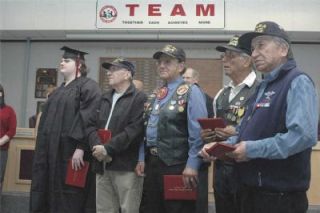MARYSVILLE Perhaps not surprisingly, many of their memories are similar.
Not surprising at all is the fact those memories are not pleasant ones.
The Chinese were everywhere, Raymond Moses, 78, said of the battle that ended the life of his brother Walter.
A Korean War veteran, Moses had transferred to his brothers unit to spend some with him just a few days before he was to be discharged. When his brother was wounded, Moses carried him to a nearby medic, apparently the only medic left alive, or at least the only one Moses could find.
The battle forced Moses to return to his duties. He heard a shell explode behind him and turned around. The round had killed his brother, the medic and numerous other soldiers.
That was the most helpless feeling Ive ever had, Moses said. There was nothing I could do.
Walter Moses was all of 20 years old when he became a casualty of war.
Like many others, Raymond Moses was called to active duty at a young age, never having earned his high school diploma. At their board of directors meeting June 16, the Marysville School District awarded long-belated diplomas to Moses and three other local veterans who marched off to fight instead of marching down an aisle somewhere in a gap and gown.
All members of the Tulalip Tribes, local residents Verle Hatch, Ralph Jones and Stanley Jones joined Moses in receiving their diplomas from Marysville schools Superintendent Larry Nyland and Marysville-Pilchuck High School Principal Tracy Suchan Toothaker.
I thought Id never see a diploma, said Moses, who noted the honor arrived some 58 years after it probably should have.
Like Moses, Hatch, 78, also served in Korea. But prior to that conflict he spent two years as part of the American occupation force in Japan following World War II.
Hatch said that duty consisted mostly of training and even allowed for sightseeing in such spots as Tokyo and Yokohoma. His experience in Korea was decidedly different.
According to Hatch, he arrived in Korea during the battle of Inchon. His unit then made its way into the interior of the country. During an ambush, Hatch was taken prisoner by the North Koreans in November 1950. Without prompting or hesitation, he states he spent 952 days as a POW.
Not incidentally, Hatch can tell you exactly how long he spent in the Army: five years, seven months and 12 days.
Of his time as a POW, Hatch said the first year was by far the worst. He said the American, British and Turkish soldiers forced together had no medical attention, little food and almost no sanitation. Hatch first states he may have gone for close to a year without a bath.
It may have six or seven months, I dont know, he said. You lose track of time.
Conditions became better during the coming years, and the prisoners assumed, as it turned out correctly, that peace talks aimed at ending the war were proceeding. He gained his freedom at the appropriately named Freedom Village in Pan Mun Jom, Korea.
Like Hatch and Moses, Ralph Jones, 76, fought in Korea. He said he spent his entire tour of duty behind the line that divided South Korea from North Korea. The phone call telling he was about to receive his high school diploma decidedly surprised him.
That was real nice, Jones said. I was kind of shocked.
A cousin of Ralph Jones, Stan Jones, 82, could not be reached for comment following the diploma ceremony. According to his cousin, Ralph Jones is a World War II vet who served in the Japanese theater, driving a tank for the Marines.
Also receiving his diploma directly from the board of directors was student Quin Kelly, 19. For various reasons, Kelly had been unable to graduate with has class.
Already heroes, now they have their high school diplomas
MARYSVILLE Perhaps not surprisingly, many of their memories are similar.



